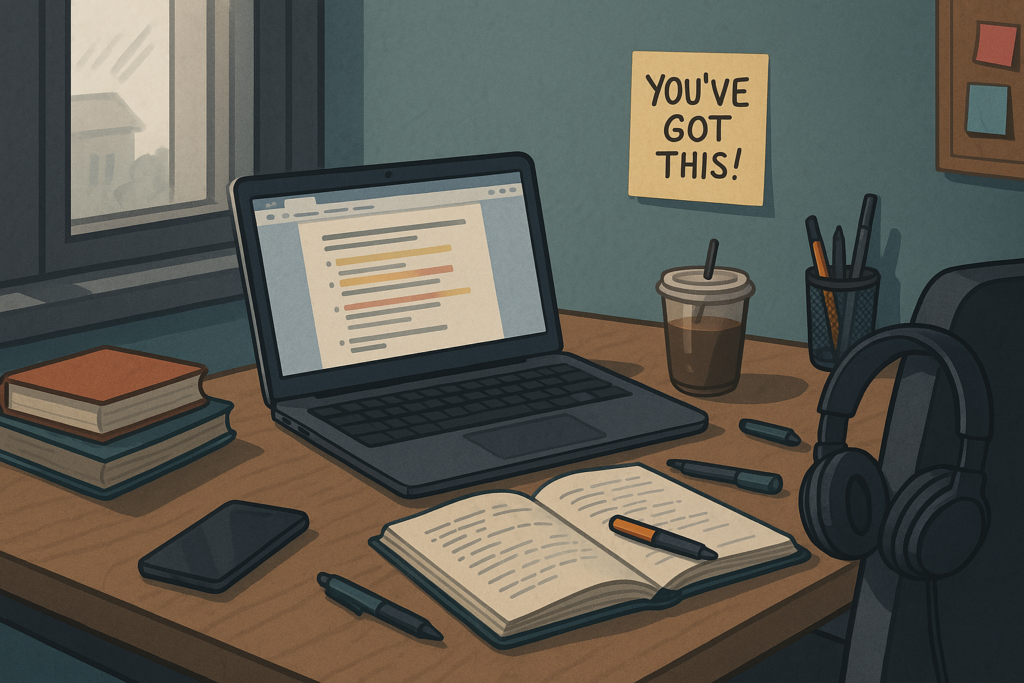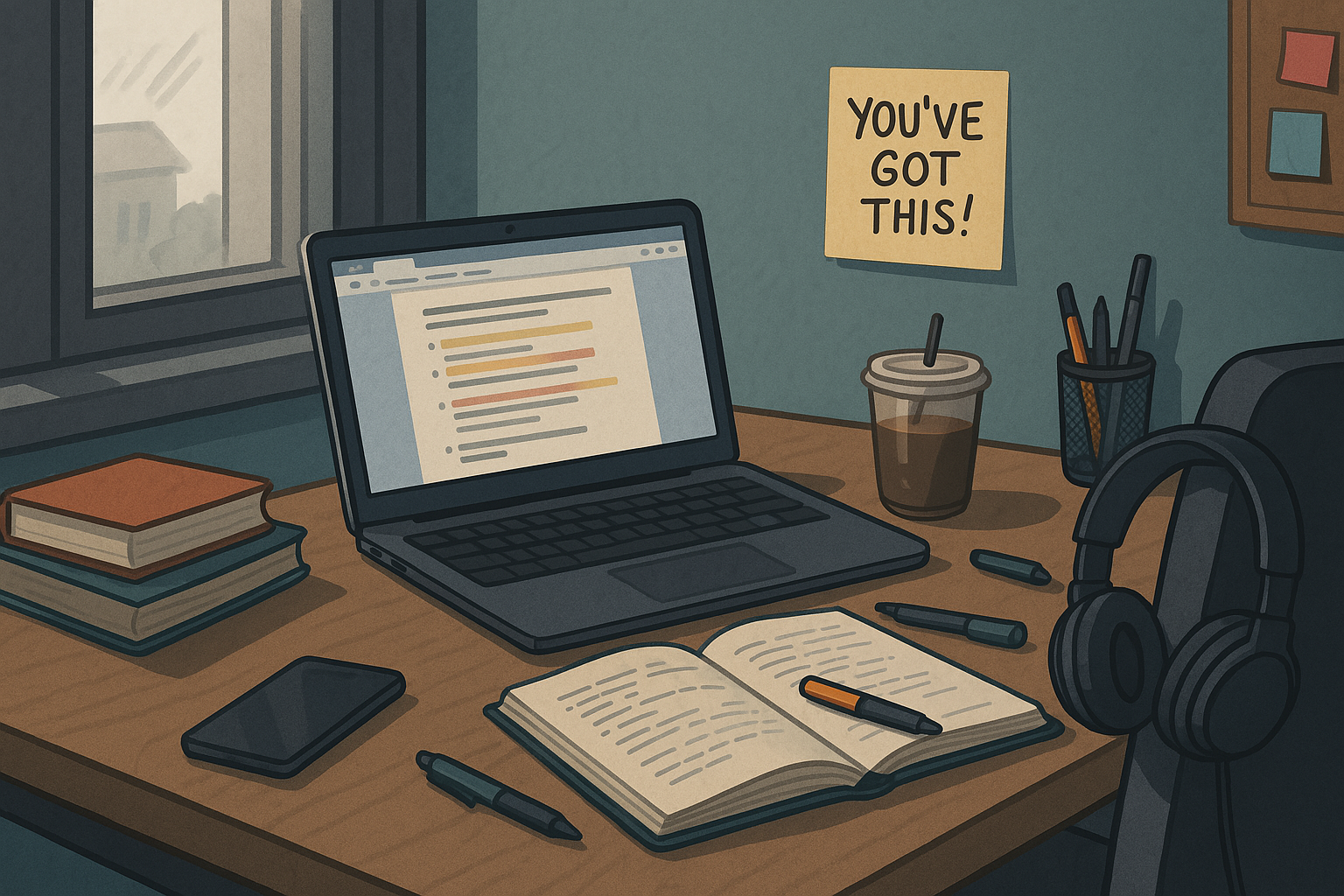Study Tips For Teens: How to Study Without Losing Your Sanity
Studying at home can feel overwhelming, especially when there’s no teacher watching over your shoulder. This guide “Study Tips For Teens: How to Study Without Losing Your Sanity” offers practical study tips for teens who are home educated.
With clever strategies, a flexible routine, and a printable timetable, you’ll be ready to smash your goals without the stress. Let’s get your brain into gear – no meltdowns required.

Why Studying Feels So Stressful (Study tips for teens)
Being home educated has loads of perks — no school uniform, no noisy classrooms, and you can learn at your own pace. But let’s be honest: sometimes it’s really hard to stay motivated. When you’re staring at a mountain of notes, a stack of past papers, or that one maths topic you still don’t get… your brain starts to scream, “Nope!”
Stress from studying is totally normal. You might feel pressure to pass exams, confusion about where to start, or worry that you’re not doing “enough.” The good news? You’re not alone. And even better — there are smart, simple ways to stay in control, feel confident, and still have a life outside your books.
This guide is full of study tips for teens learning at home. Whether you’re working towards GCSEs, planning for college, or just want to improve your learning habits, you’ll find realistic advice to study smarter — not harder.
How to Study (and Actually Remember Things)
Let’s break this down into manageable chunks. Think of studying like training for a game or a sport. You need a good strategy, regular practice, and enough rest to win.
Here’s how to do it:
1. Set Clear Goals
Don’t just say “I’m going to study today.” Be specific. Try:
“I’ll revise biology flashcards from 10am to 10:30am.”
“I’ll complete two maths questions and check the answers.”
Ticking off small goals feels great and keeps you moving forward.
2. Use the Pomodoro Technique
This is a game-changer:
Study for 25 minutes.
Take a 5-minute break.
Repeat.
After four sessions, take a longer break (15–30 minutes).
It helps you stay focused without burning out.
3. Mix It Up
Don’t cram one subject all day. Switch between topics to keep your brain interested. Example:
Morning: English
Afternoon: Science
Evening: Creative subject like art or coding
4. Active Beats Passive
Reading a textbook is okay, but you’ll remember way more if you do something:
Write flashcards
Make mind maps
Teach the topic to someone else (even your dog!)
Take quizzes online
Watch short videos and summarise them in your own words
5. Know When to Stop
If your brain’s foggy or you’re yawning every 10 seconds — take a break! Sleep, snacks, and movement help you reset. Studying while exhausted just wastes time.
Staying Calm Before Exams
Even the word “exam” makes some people panic. But with the right tools, you’ll walk in (or log in) feeling way more relaxed.
1. Start Early
Don’t leave revision until the last week. Start months ahead with short, regular sessions. That way, you’re not trying to stuff everything into your brain at once.
2. Practise Under Pressure
Download past papers and time yourself. Pretend it’s the real thing. You’ll get used to the format and feel more confident on the day.
3. Use Rewards
Motivate yourself! Try:
A small treat after a session (chocolate, gaming, YouTube)
A bigger reward when you finish a week of good study
It keeps your mood high and your brain happy.
4. Breathe
Learn a quick breathing exercise: breathe in for 4 seconds, hold for 4, out for 4. It slows your heart rate and calms nerves. Try it before starting a hard topic or during an exam.
Sticking to a Study Plan
The trick to staying organised is having a timetable — but one that works for you. Some teens love early mornings. Others are night owls. Create a plan that fits your energy levels, interests, and attention span.
You can print the blank timetable below and fill it in each week. Keep it flexible — if something takes longer or you need a break, that’s okay! The idea is to guide you, not trap you.
If you need help getting started, check out our GCSE learning hub or explore our maths revision worksheets.
Final Thought: You’ve Got This
Studying at home can be tough — but also brilliant. You’re in charge of your own learning, and that’s a powerful thing. Use the tools in this guide, stay kind to yourself, and remember: success doesn’t come from stressing — it comes from building strong habits and believing in yourself.
Need more help with tricky subjects or motivation tips? Ask! You’re not meant to figure it all out alone. You can also visit [BBC Bitesize](https://www.bbc.co.uk/bitesize) for more study support.
